Lewis v Averay [1972] 1 QB 198
Judgement for the case Lewis v Averay
Table Of Contents
Plaintiff sold a car to a fraudster, X, who purported to be a famous actor and asked to pay by cheque.
Plaintiff asked for proof and X produced a pass to the film studios and a photo of the actor, who he looked like. Plaintiff then agreed to let him pay by cheque and allowed him to take the car. The cheque bounced and X sold the car to a BF purchaser, Defendant.
Plaintiff sued X for the car.
CA said Defendant should keep the car.
Lord Denning MR
It is untrue that in Philips the fraudster gave his false identity after the contract was formed. Also the distinction between a man’s attributes (e.g. credit worthiness) and a man’s identity (e.g. his name) is irrelevant and have the same effect. Also it is arguable that a BF purchaser is more innocent than a defrauded seller since it is the seller who gives the fraudster the object by which he can effect his fraud.
The law is this: Where two parties enter a contract or what appears to be a contract, the fact that one party is mistaken as to the identity of the other does not void the contract. The contract can only be voided by the mistaken party on this ground before an innocent TP acquires rights to the thing.
Hence there is a presumption that where the party can see the purchaser in front of him there is still a contract conferring rights to the defrauding party, and the contract can be voided under fraud only before the property is transferred to a BF TP.
-
Here, Plaintiff’s contract with X was valid and, though voidable, was not yet void.
-
Problems with this decision:
Even if Dennning’s summary of the law is right, it still does not show why the presumption applies to cases where X is before Plaintiff physically but not where the contract has been formed by correspondence.
The assertion that the seller ought to bear the loss rather than innocent TP is wrong: his reason form saying the Plaintiff was more at fault than Defendant is obviously wrong, whereas placing the risk of loss on Defendant would deter buyers from making purchases without first checking the validity of the sale which would avoid scenarios such as this as well as making it harder for fraudsters to profit from their activities.
The voidable-void distinction is bad since the defrauded party’s rights depend on how quickly it takes for it to become clear that they have been defrauded and how quickly they are able to enforce their rights, which is very unfair.
-
RELATED CASES
For Further Study on Lewis v Averay

These are detailed case summaries (excerpts from cases - not paraphrase...

Contract law notes fully updated for recent exams at Oxford and Cambrid...
Need instant answers? Our AI exam tutor is here to help.
Ask questions 🙋 Get answers 📔 It's simple 👁️👄👁️
Our AI is educated by the highest scoring students across all subjects and schools. Join hundreds of your peers today.
Get StartedSimilar Cases
Related Product Samples
These product samples contain the same concepts we cover in this case.

 Since 2010, Oxbridge Notes has been a trusted education marketplace, supplying high-quality materials from top achievers at universities like Oxford, Cambridge, LSE, Harvard, and Yale.
Since 2010, Oxbridge Notes has been a trusted education marketplace, supplying high-quality materials from top achievers at universities like Oxford, Cambridge, LSE, Harvard, and Yale.